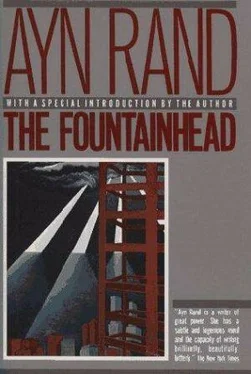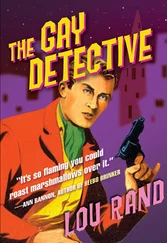He said:
"I'll never remind you afterward that you're crying, Dominique."
The story, including the pyjamas, the dressing gown, the breakfast table and the single bed, was in all the afternoon papers of New York that day.
Alvah Scarret walked into Wynand's office and threw a newspaper down on his desk. Scarret had never discovered how much he loved Wynand, until now, and he was so hurt that he could express it only in furious abuse. He gulped:
"God damn you, you blasted fool! It serves you right! It serves you right and I'm glad, damn your witless soul! Now what are we going to do?"
Wynand read the story and sat looking at the paper. Scarret stood before the desk. Nothing happened. It was just an office, a man sat at a desk holding a newspaper. He saw Wynand's hands, one at each side of the sheet, and the hands were still. No, he thought, normally a man would not be able to hold his hands like that, lifted and unsupported, without a tremor.
Wynand raised his head. Scarret could discover nothing in his eyes, except a kind of mild astonishment, as if Wynand were wondering what Scarret was doing here. Then, in terror, Scarret whispered:
"Gail, what are we going to do?"
"We'll run it," said Wynand. "It's news."
"But ... how?"
"In any way you wish."
Scarret's voice leaped ahead, because he knew it was now or never, he would not have the courage to attempt this again; and because he was caught here, he was afraid to back toward the door.
"Gail, you must divorce her." He found himself still standing there, and he went on, not looking at Wynand, screaming in order to get it said: "Gail, you've got no choice now! You've got to keep what's left of your reputation! You've got to divorce her and it's you who must file the suit!"
"All right."
"Will you? At once? Will you let Paul file the papers at once?"
"All right."
Scarret hurried out of the room. He rushed to his own office, slammed the door, seized the telephone and called Wynand's lawyer. He explained and went on repeating: "Drop everything and file it now, Paul, now, today, hurry, Paul, before he changes his mind!"
Wynand drove to his country house. Dominique was there, waiting for him.
She stood up when he entered her room. She stepped forward, so that there would be no furniture between them; she wished him to see her whole body. He stood across the empty space and looked at her as if he were observing them both at once, an impartial spectator who saw Dominique and a man facing her, but no Gail Wynand.
She waited, but he said nothing.
"Well, I've given you a story that will build circulation, Gail."
He had heard, but he looked as if nothing of the present were relevant. He looked like a bank teller balancing a stranger's account that had been overdrawn and had to be closed. He said:
"I would like only to know this, if you'll tell me: that was the first time since our marriage?"
"Yes."
"But it was not the first time?"
"No. He was the first man who had me."
"I think I should have understood. You married Peter Keating. Right after the Stoddard trial."
"Do you wish to 'know everything? I want to tell you. I met him when he was working in a granite quarry. Why not? You'll put him in a chain gang or a jute mill. He was working in a quarry. He didn't ask my consent. He raped me. That's how it began. Want to use it? Want to run it in the Banner?"
"He loved you."
"Yes."
"Yet he built this house for us."
"Yes."
"I only wanted to know."
He turned to leave.
"God damn you!" she cried. "If you can take it like this, you had no right to become what you became!"
"That's why I'm taking it."
He walked out of the room. He closed the door softly.
Guy Francon telephoned Dominique that evening. Since his retirement he had lived alone on his country estate near the quarry town. She had refused to answer calls today, but she took the receiver when the maid told her that it was Mr. Francon. Instead of the fury she expected, she heard a gentle voice saying:
"Hello, Dominique."
"Hello, Father."
"You're going to leave Wynand now?"
"Yes."
"You shouldn't move to the city. It's not necessary. Don't overdo it. Come and stay here with me. Until ... the Cortlandt trial."
The things he had not said and the quality of his voice, firm, simple and with a note that sounded close to happiness, made her answer, after a moment:
"All right, Father." It was a girl's voice, a daughter's voice, with a tired, trusting, wistful gaiety. "I'll get there about midnight. Have a glass of milk for me and some sandwiches."
"Try not to speed as you always do. The roads aren't too good."
When she arrived, Guy Francon met her at the door. They both smiled, and she knew that there would be no questions, no reproaches. He led her to the small morning room where he had set the food on a table by a window open to a dark lawn. There was a smell of grass, candles on the table and a bunch of jasmine in a silver bowl.
She sat, her fingers closed about a cold glass, and he sat across the table, munching a sandwich peacefully.
"Want to talk, Father?"
"No. I want you to drink your milk and go to bed."
"All right."
He picked up an olive and sat studying it thoughtfully, twisting it on a colored toothpick. Then he glanced up at her.
"Look, Dominique. I can't attempt to understand it all. But I know this much — that it's the right thing for you. This time, it's the right man."
"Yes, Father."
"That's why I'm glad."
She nodded.
"Tell Mr. Roark that he can come here any time he wants."
She smiled. 'Tell whom, Father?"
"Tell ... Howard."
Her arm lay on the table; her head dropped down on her arm. He looked at the gold hair in the candlelight. She said, because it was easier to control a voice: "Don't let me fall asleep here. I'm tired."
But he answered:
"He'll be acquitted, Dominique."
All the newspapers of New York were brought to Wynand's office each day, as he had ordered. He read every word of what was written and whispered in town. Everybody knew that the story had been a self-frame-up; the wife of a multimillionaire would not report the loss of a five-thousand-dollar ring in the circumstances; but this did not prevent anyone from accepting the story as given and commenting accordingly. The most offensive comments were spread on the pages of the Banner.
Alvah Scarret had found a crusade to which he devoted himself with the truest fervor he had ever experienced. He felt that it was his atonement for any disloyalty he might have committed toward Wynand in the past. He saw a way to redeem Wynand's name. He set out to sell Wynand to the public as the victim of a great passion for a depraved woman; it was Dominique who had forced her husband to champion an immoral cause, against his better judgment; she had almost wrecked her husband's paper, his standing, his reputation, the achievement of his whole life — for the sake of her lover. Scarret begged readers to forgive Wynand — a tragic, self-sacrificing love was his justification. It was an inverse ratio in Scarret's calculations: every filthy adjective thrown at Dominique created sympathy for Wynand in the reader's mind; this fed Scarret's smear talent. It worked. The public responded, the Banner's old feminine readers in particular. It helped in the slow, painful work of the paper's reconstruction.
Letters began to arrive, generous in their condolences, unrestrained in the indecency of their comment on Dominique Francon. "Like the old days, Gail," said Scarret happily, "just like the old days!" He piled all the letters on Wynand's desk.
Wynand sat alone in his office with the letters. Scarret could not suspect that this was the worst of the suffering Gail Wynand was to know. He made himself read every letter. Dominique, whom he had tried to save from the Banner ...
Читать дальше










